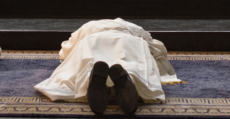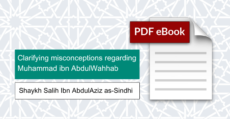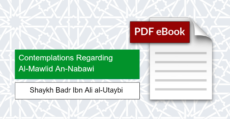In the name of Allāh, ar-Raḥmān (the most merciful), ar-Raḥīm (the bestower of mercy).
All praise belongs to Allāh, and may peace and blessings be upon the Prophet, his family, and his Companions.
There are some important questions that anyone who celebrates the so-called Mawlid — the birthday of the Prophet ﷺ — should sincerely ask themselves:
- How many times did the Prophet ﷺ celebrate his own birthday?
- In which place did the noble Companions (رضي الله عنهم) celebrate the Prophet’s birthday?
- What procession (juloos) did they organise for the Prophet’s birthday?
- What type of sweets did the Prophet ﷺ and his Companions (رضي الله عنهم) distribute on this day?
- Which poetry or nasheeds did they sing during this supposed celebration?
If you search the authentic books of ḥadīth and Sunnah, you will find no trace of these answers. Then turn to the early period after the Prophet ﷺ — the time of the Four Rightly Guided Caliphs, and ask yourself the following questions:
- How much did Abū Bakr, ʿUmar, ʿUthmān and ʿAlī, raḍiallāhu ‘anhum, spend on state decorations for the Mawlid?
- How many people joined their marches on the 12th of Rabīʿ al-Awwal?
- For how many days did they declare a public holiday in honour of the Mawlid?
Again, the books of history and reports from their time are silent.
Then look into the age of the great Imāms of the early generations — Abū Ḥanīfah, Mālik, al-Shāfiʿī and Aḥmad ibn Ḥanbal, and ask yourself the following questions:
- What do their writings say about the Mawlid?
- In which mosques did these scholars hold their mehfils and gatherings on the night of the Mawlid?
- What instructions did Imām Abū Ḥanīfah give his students about organising such celebrations?
If the answers cannot be found among the Prophet ﷺ, his noble Companions, the Caliphs, or the earliest generations of scholars, then one must honestly ask:
- If there is no precedent from those who loved the Prophet ﷺ the most, then where has this action come from?
- Why claim that celebrating the Mawlid is love for the Prophet ﷺ when those who had the purest and most complete love for him — the Companions and their followers — never did it?
- Why criticise those who refrain from it, when in fact they are following the way of the Prophet ﷺ, his Companions, and the righteous early scholars who never practised it?
The True Sign of Loving the Prophet ﷺ
True devotion to the Messenger ﷺ is not through innovated celebrations, but by following his Sunnah. Allāh himself made this the criterion of love:
{قُلْ إِن كُنتُمْ تُحِبُّونَ ٱللَّهَ فَٱتَّبِعُونِى يُحْبِبْكُمُ ٱللَّهُ وَيَغْفِرْ لَكُمْ ذُنُوبَكُمْ ۗ وَٱللَّهُ غَفُورٌ رَّحِيمٌ}
{Say: If you truly love Allāh, then follow me; Allāh will love you and forgive you your sins. Indeed, Allāh is oft-forgiving, most merciful} [03:31]
Allāh also said:
{وَمَآ ءَاتَىٰكُمُ ٱلرَّسُولُ فَخُذُوهُ ۖ وَمَا نَهَىٰكُمْ عَنْهُ فَٱنتَهُوا۟ ۚ وَٱتَّقُوا۟ ٱللَّهَ ۖ إِنَّ ٱللَّهَ شَدِيدُ ٱلْعِقَابِ}
{Whatever the Messenger gives you, take it; and whatever he forbids you, refrain from it. And fear Allāh, for indeed Allāh is severe in punishment} [59:07]
Ibn Kathīr commented on the first āyah:
“This noble āyah is a decisive proof against those who claim to love Allāh, yet they are not upon the path of Muḥammad ﷺ. They are not truthful in their claim until they follow his Sharīʿah, his religion, his sayings, actions, and way.” [1]
Conclusion
The only way to prove our love for the Prophet ﷺ is by obedience, not innovation. Any act of worship must meet two conditions:
- Ikhlāṣ (sincerity) — doing it purely for Allāh.
- Ittibāʿ (following the Sunnah) — doing it as the Prophet ﷺ himself taught and practised.
Without these two, deeds are rejected, no matter how good the intention.
{يَـٰٓأَيُّهَا ٱلَّذِينَ ءَامَنُوٓا۟ أَطِيعُوا۟ ٱللَّهَ وَأَطِيعُوا۟ ٱلرَّسُولَ وَلَا تُبْطِلُوٓا۟ أَعْمَـٰلَكُمْ}
{O you who believe, obey Allāh and obey the Messenger, and do not invalidate your deeds} [47:33]
We ask Allāh to guide us to His love and the love of His Messenger, and to protect us and all Muslims from every form of bidʿah. May Allāh’s peace and blessings be upon our Prophet Muḥammad, his family, his Companions, and all those who follow his Sunnah until the Day of Judgement.
Written by the one in need of Allāh
Abul Abbaas Naveed
Nelson, Lancashire, UK
6th Rabīʿ al-Awwal 1436 AH / 28th December 2014
Footnotes
[1] Tafsīr Ibn Kathīr, Surah Āl Imrān, āyah 31-33






that is good my brother
their many people that cleabrearion of the barth of prophet (pbuh).
jazakallahu kairin my brother to tell the true
Baarakallah feekum